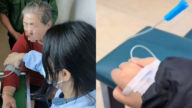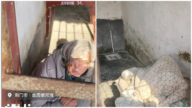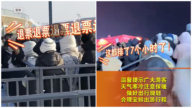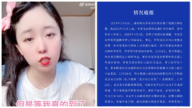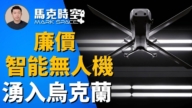【新唐人2013年01月08日訊】官員財產公開作為一種預防和遏制腐敗的手段,在很多國家已成為一項制度化的措施。而在中國大陸,官員財產公開仍舊是「只聞樓梯響,不見人下來」。雖然廣東、江蘇等地的試點工作引起極大關注,但一項調查顯示,超過9成的受訪者表示不信任官員財產公開。
中共總書記習近平及新領導班子上任伊始,即高唱「反貪腐」、「改作風」,並採取了一些新措施﹔而中紀委書記王岐山在去年11月也喊出要「把反腐鬥爭引向深入」的口號。這讓被視為「反腐利器」的官員財產公示問題近來備受關注。
官員財產公開至今已在大陸27個市縣推行過試點,珠海橫琴新區、廣州南沙新區、韶關始興縣成為3個「新成員」。
不過,據《中國青年報》1月7號報導,一項有5604人參與的網路在線調查顯示,90.81%網民對官員財產公示持不信任態度,理由是「灰色收入和轉移性財產誰會公示﹖」
而在各試點地方,「甚麼財產需要公示」標準不一。例如在重慶江北區,「擬提拔官員」的家庭成員及收入財產等情況不會公示,只作為「組織上掌握」。
北京時政觀察人士華頗表示,很多官員或他們妻兒的名下即使沒有甚麼財產,也能通過其他方式,如秘密賬戶等轉移財產。
北京時政觀察人士華頗:「七常委公布的財產,前陣子網路流傳公布的財產,只是他們夫妻兩人的財產,並沒有說他們孩子有多少財產。官員財產公開得扭扭捏捏,猶豫不定,再加上不徹底性,所以引起了廣大網友的不信任。」
對此,網友(「迷失水晶貓」)留言說:「居然還有一成人天真的相信,貪官們 更不相信。」還有網友(「樂活潛水員」)則譏笑說:「那剩下的1成人就是官員本人和家屬了 。」
法學和中國問題研究專家趙遠明指出,由於中共一直是靠謊言、欺騙來維持它的獨裁統治,這種長期以來在人們心中留下的印象,也造成民眾難以相信。
法學和中國問題研究專家趙遠明:「腐敗搞女人、淫亂,維持不正當性關係的,都不是一位數字,大部分都是兩位數字,甚至還有上三位數字的。而且有些很小的官,貪污的數字卻是非常大的,上億。那麼在老百姓心目當中,曝光的這些幹部都貪這麼多,現在一到公開官員財產的時候,突然這個數字就小很多,是不成比例的。」
報導說,在試點的27個市、縣中,江蘇淮安、重慶江北區和黔江區正在探索阻力最小的路子,那就是在所謂「擬提拔官員」中率先推行財產公示。
法學和中國問題研究專家 趙遠明:「新提拔的官員,他可能相對來講比較清廉。當他位置比較低時,一,他沒有這種能力;不公平,新任官員估計也難以接受。
北京時政觀察人士華頗:「因為反差實在太大了。他們的前任都賺得腦滿腸肥,到他們就只剩下清湯寡水,他們心裡是過不去的。而且他們的前任積纍的財產都是民脂民膏,怎麼能說讓他們就逍遙法外,平安下莊呢?這是很不合理的事情。民眾也不會答應。」
官員財產公示制度在全球近100個國家和地區實行,自1987年首次在中國提出後,走過了25年的「醞釀期」,如今,二十多年過去了,官員財產仍然難以落實。
法學和中國問題研究專家趙遠明:「真正的公布財產,還要有群眾的監督。否則的話,公布財產肯定是走過場。肯定是糊弄老百姓。關鍵是制度的改革,要有監督的程序。」
對於中共所謂的財產公開,華頗不抱樂觀態度。他說,到底公開到甚麼程度,還有待觀察。但在維持目前獨裁體制的前提下,很有可能會做出「一鍋『夾生飯』。」
採訪/李韻 編輯/王子琦 後製/陳建銘
Over 90% Distrust CCP Officials’ Publicized Assets
In many countries, publicizing the officials’ assets has
become an institutionalized measure in preventing corruption.
In Mainland China, the measure is in a state of ‘all talk
and no action’ or as locals put it, “only thunder, but no rain”.
Pilot programs in Guangdong, Jiangsu and other provinces
have brought great concern—as a survey shows,
more than 90% of people say, they do not trust the
legitimacy of the officials’ property publications.
The Chinese Communist Party (CCP)’s,
new leader Xi Jinping promoted anti-corruption and
a ‘change in style’ right after taking power,
introducing some new measures.
Secretary of Central Commission for Discipline Inspection,
Wang Qishan, also raised a “deeper fight against corruption”
last November; triggering the publication of official assets as
an anti-corruption tool—it’s an issue of public concern lately.
Pilot programs for publicizing the officials’ properties are
being implemented in 27 cities and counties in the mainland.
The Hengqin New District, Guangzhou Nansha New District,
and Shaoguan Shixing County are 3 new areas adopting it.
China Youth Daily published an online survey on January 7
saying, over 90% of the 5,604 people surveyed do not trust the publicized property reports,
due to typical ‘gray income’
and ease in the transfer of property.
In each of the areas, different standards have been used
regarding what type of property needs to be publicized.
For example, in Jiangbei District of Chongqing, family
members and promoted officials are not required to
publicize their property—the information is made known
to the CCP and kept officially.
Current Affairs Observer in Beijing said that many officials
had hidden their properties, they transfer their properties by all secret means.
[Hua Po,]: “In China, many officials or their wives and
children have no property under their names,
since property can be transferred through other means,
like a secret account.
The seven Standing Committee members
did announce their property recently,
but it was limited to husband and wife,
and their children weren’t included.
The officials’ great reluctance to participate, along with
the program’s lack of thoroughness has caused distrust from the majority of people.”
Netizen (“Lost Crystal Cat") said, “In actuality,
some people are even naïve enough to believe the reports;
corrupt officials, of course, do not believe them.”
Netizen (“Happy Divers") said, “What about the other 10%?
—must be the officials themselves and their families."
Lawyer and China expert, Zhao Yuanming, points out that,
the CCP has always relied on lies and deception to maintain
its dictatorship; this long-term image causes public distrust.
[Zhao Yuanming]: “You name it—corruption;
womanizing; sexual misconduct;
maintaining mistresses in the double or even triple digits—
it’s all ripe in the history of the CCP.
Some low ranking officials have pocketed a ton of money,
even as much as hundreds-of-millions.
The public remember that those officials who were exposed
had accumulated such great wealth.
But when the officials publicize their assets, the figures
have shrunk drastically—it’s not proportionate at all.”
Among the 27 pilot cities and counties, Huai’an, Jiangsu,
Chongqing’s Qianjiang District and Jiangbei District are
reported to have experienced the least amount of resistance
in implementing the publication program.
Yet it’s worth noting—the program has been applied firstly
to the newly promoted officials or those awaiting promotion.
[Zhao Yuanming]: “Newly promoted officials may be relatively
straight; because of their low rank they lack the skill and greed.”
Yet, Hua po says, the new officials’ disclosures
are also hard to believe.
[Hua Po]: “It’s hard to accept,
because the contrast is too great;
their predecessors acquired so much and
now these officials say they have hardly anything.
After all, it’s the public’s hard earned money
they’re taking—how can they escape punishment?
The whole thing is very unreasonable
and the public do not agree with it either.”
Nearly 100 countries and regions worldwide are applying
this public disclosure of official property, and it was first introduced in China in 1987.
After a gestation period of 25 years,
it’s now still proving difficult to implement.
[Zhao Yuanming]: “To really publicize assets needs mass
public supervision;
otherwise, it’s only about going through the motions
and is based on fooling the public.
The key issue of system reform is on having a public
supervision procedure."
Hua Po says he is not optimistic about the
CCP’s disclosure of official assets.
He said that how much they will disclose
remains to be seen,
but under the premise of maintaining the CCP’s dictatorship,
it’s likely the program will be ran half-heartedly
—it’s like making a pot of half-cooked rice.




